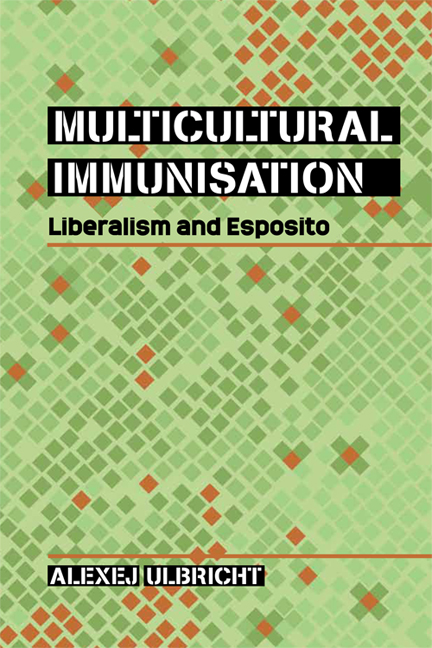Book contents
- Frontmatter
- Contents
- Acknowledgements
- 1 Introduction
- 2 Liberal Thought on Multiculturalism
- 3 Multiculturalism as a Mode of Immunising the Body of Liberalism
- 4 Liberal Multiculturalism and Rights: Citizens, Humans and Other Subjects
- 5 Disagreement and the Horizons of Consensus
- 6 Recognition: Tolerant, and Cunning
- 7 Multiculturalism Beyond Immunity
- 8 Conclusion
- Bibliography
- Index
2 - Liberal Thought on Multiculturalism
Published online by Cambridge University Press: 05 August 2016
- Frontmatter
- Contents
- Acknowledgements
- 1 Introduction
- 2 Liberal Thought on Multiculturalism
- 3 Multiculturalism as a Mode of Immunising the Body of Liberalism
- 4 Liberal Multiculturalism and Rights: Citizens, Humans and Other Subjects
- 5 Disagreement and the Horizons of Consensus
- 6 Recognition: Tolerant, and Cunning
- 7 Multiculturalism Beyond Immunity
- 8 Conclusion
- Bibliography
- Index
Summary
In this chapter I will be outlining the ways in which liberal political theorists have dealt with the issue of multiculturalism. Concretely, this means looking at the ways in which liberal theorists gradually over time started to address the issue of difference. Since liberal ways of accommo - dating difference exhibit significant breadth, my larger inquiry will limit itself to three theorists: Will Kymlicka, Bhikhu Parekh and Charles Taylor. However, I want to use this chapter to showcase the larger scope of liberal thinking on multiculturalism, and also to justify why I will be picking these three particular theorists as representative liberals for the remainder of the book.
A BRIEF HISTORY OF LIBERAL POLITICAL THEORY's ENGAGEMENT WITH DIFFERENCE
The general view is that liberalism has traditionally been unwilling to engage with difference. More specifically: it is concerned with ensuring freedom for people to be different in the sense of individual, private idiosyncrasies, but does not engage with difference as a category, as something that exists in the public realm, as something that confronts the state. Liberalism is concerned with individuals, with equality, and with freedom – and any protection of difference or culture is seen to be amply covered in these rubrics. Because of this:
That the issue of cultural diversity rose to theoretical prominence in the form of criticisms of liberalism strikes many liberals as surprising. After all, liberalism, at least according to its own selfunderstanding, was itself a philosophy developed partly in response to issues of diversity.
And in fact, if we look at liberal thinking before World War II, there is quite a bit of liberal thinking on difference. Liberals were generally in support of rights for national minorities and criticised their unjust treatment in the multinational empires. Furthermore, while there were also plenty of liberals arguing for assimilation, issues of culture and difference were seen as something that needed to be talked about and that the state should be concerned with, rather than being private matters. Another way in which liberalism has traditionally thought about difference is through the issue of religious toleration (although of course this was generally a matter of inter-Christian toleration).
- Type
- Chapter
- Information
- Multicultural ImmunisationLiberalism and Esposito, pp. 22 - 44Publisher: Edinburgh University PressPrint publication year: 2014



